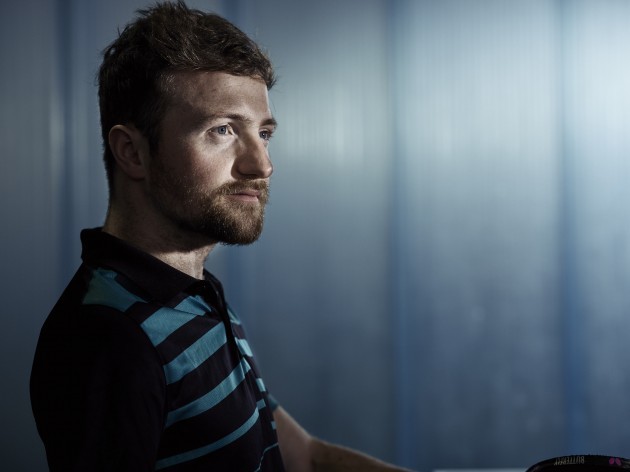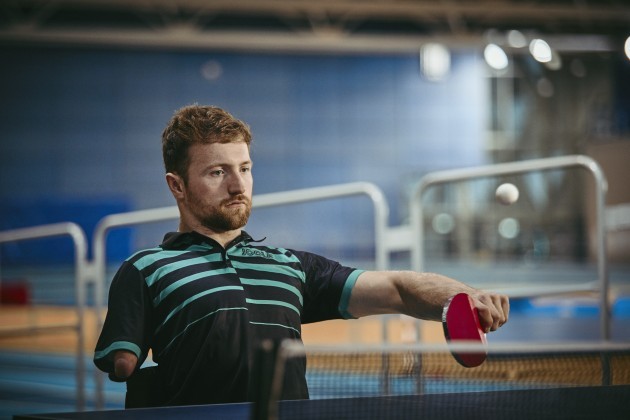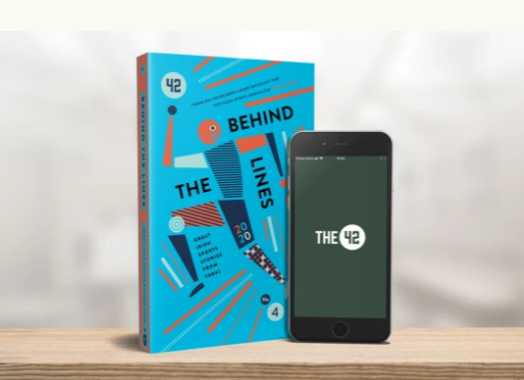COLIN JUDGE’S STORY is one of resilience.
He’s encountered — and overcome — many setbacks and much adversity along the way, but his success far exceeds any of them. The positives certainly outweigh the negatives, with the latter used as motivation to drive him on.
On the cusp of qualifying for the Paralympic Games in Tokyo this summer, the Dubliner casts his mind back to where his relationship with sport first began.
Born with three missing limbs, he never considered himself any different to his peers — until he reached secondary school.
“It all started when I was about 12 or 13,” he tells The42. “I was attending an able-bodied school, St. Michael’s College, a big rugby school. All my mates started playing rugby, and this was the first time in my life that my disability hit me quite hard.
“I realised that there was a lot of things that I couldn’t do, and I wasn’t really aware of that before. I didn’t have very much confidence in myself, and I wasn’t really able to deal my disability in the teenage years.
“But I knew that finding a sport would would help me find confidence in myself and would help me forget about the problems that I thought I had.”
He tried out a number of sports from there, and of course, wheelchair rugby was the first of those. “I wanted to be like the lads,” he smiles, looking back.
“It was a lot of fun but unfortunately, I wasn’t very good at it. Because of my disability, I couldn’t bounce the ball and move the wheelchair and I think my wheelchair rugby team were pretty happy to see me go!”
Judge kept trying and testing, and eventually found table tennis. When he discovered it was the first sport he could beat his brother at, he was sold.
And really, he hasn’t looked back since.
“Table tennis has changed my life in so many ways. It’s a big part of the person that I am today. In my teenage years when I found table tennis, it was the first time in my life that I had a passion and a drive and something that made me realise that for all those things that I couldn’t do, that there was a lot that I could do.
“I really felt that table tennis was a sport that I could use what I’ve got to my advantage. I think that was a big reason why I was drawn to it, not only for the physical aspect of it, but also the mental. I felt that I had a good brain and that I could definitely use that to my advantage. I think a lot of the successes that I’ve achieved in table tennis have definitely translated into other areas of my life, and I’m very grateful for that.”
Please get behind me and my teammates and help us reach #TheNextLevel in Tokyo this August!
— Colin Judge (@ColinJudge95) March 19, 2021
Check out @paralympics_ireland and follow the link in their bio to donate.
All donations are hugely appreciated and go a long way in helping us become the best we can be 👌🏻 pic.twitter.com/UAeaWIrWlU
The 25-year-old’s Paralympic dream really took off in 2012, having gone to the London Games to watch some of the football with his father. Judge had certainly caught the table tennis bug by then, with a fire in his belly.
He laughs, admitting he wasn’t overly good at the time but he was very serious about it and training a lot. And what he saw on the world’s biggest stage certainly spurred him on.
“I suppose it was the first time in my life that I saw guys with disabilities similar to myself, I saw them playing at such a high level and I thought to myself, ‘If they can do it, why can’t I?’”
Rio 2016 quickly became the goal. He spent the next few years travelling around the world, slowly but surely moving up the rankings. That Paralympic year, he started to beat some of the best in the game and his ranking shot up, but he fell agonisingly short in the end.
He missed out on the Games by just one place, while leading a very busy life.
“I was obviously really disappointed when Rio came around. But I suppose at that stage, I had a lot of other things going on. I was studying to be an actuary, I was working in KPMG.
“I knew that I didn’t give it 110%. That was kind of a regret that I had, even though I had a lot of other things going on. I promised myself that when Tokyo 2020 would come around that I’d be more than ready for it, and that I’d give it my all – 110%.”
He watched all the happenings from Brazil closely, at peace with his shortfalling, motivated and determined that he would not be in the same position next time around.
Both mentally and physically, he was in a good place, balancing training with his intense work schedule. He showed real resilience to come back stronger, winning a gold medal at the European Championships in 2017.
Everything was going to plan and coming along nicely. Until he shipped a heavy blow out of the blue, and was reclassified in 2019.
For those unaware, Paralympics is classified on the severity of one’s disability. Wheelchair classes are from 1 to 5, 1 being the most physically disabled and 5 the least. Judge was declared Class 2 at the age of 13, and presumed that would never change.
“When the doctor said that they were sorry, that they were going to have to move me up into Class 3, it had a huge impact on me,” he picks up the story.
“I knew what it meant immediately. It meant that I was going to be competing against athletes that were considerably physically stronger, and meant that I was going to lose my ranking and lose a lot of my funding.
“It’s been one of the most difficult things that I’ve ever had to deal with, but I suppose, with hindsight, it’s turned me into a much better player. When I was reclassified, I realised that I had to become better, I had to start playing at a higher level. It was as simple as that.”
Mind over matter, he stepped it up, going on to win several tournaments in his new class, and even coming close to a bronze medal at World Championships.
He went on sabbatical leave from his job in KPMG, and became a full-time athlete in 2019.
“It was a very tough decision to make,” he nods, “because I was very happy at KPMG and they were hugely supportive of me. It was obviously a good job, it was well-paid.
“I was two-and-a-half years in the place, I was starting to learn the ropes and I was becoming better as an actuary, but I just knew that working 50, 60 hours-a-week, I was never going to reach my potential in table tennis. I have no regrets.”
Now two ranking places off booking his ticket Tokyo, it all comes down to a world qualification event on 3 June in Slovenia. With one spot up for grabs there, it’s winner takes all, so that’s number one on Judge’s list of priorities.
Based predominantly in Dublin through the Covid-19 crisis, he normally trains with a fellow para-table tennis player in Slovakia and competes in the Bundesliga in Germany as he’s the only table tennis athlete competing for Paralympics Ireland — but he’s enjoyed mostly home comforts of late.
“I feel the pandemic has definitely worked in my favour,” he nods, outlining the graft he’s put in at home — from training with a robot that shoots balls at him and acts as a training partner, to the little things he’s worked on from service practice and video analysis sessions on Zoom with his coach — and abroad at a camp in Slovakia.
“I feel I’m twice a player that I was last year. I’ve put an awful lot of work in, I’ve changed an awful lot of things around and I feel I’ve used the time very well.
“I’m just looking forward now to getting back competing and testing my skills on the big stage and properly seeing where I’m at.”
He’s certainly confident he’s in a good place, but all will be revealed in June.
To finish, just how much would it mean to make the Paralympic Games this summer? To perform on the biggest stage in Tokyo, to reach the summit after everything he’s been through?
Everything, in short.
“Ah, it’s hard to put into words,” Judge concludes. “Paralympics and table tennis, it’s something that holds a really special place in my heart. And obviously the Paralympics is the pinnacle of table tennis. It’s table tennis at the highest level, and I’d just really love to be a part of that.
“I suppose the other side of it is inspiring the next generation. One of my big goals in life is to share my story, some of the obstacles that I’ve encountered and overcome and hopefully inspire others — particularly disabled people, but it doesn’t necessarily need to be a disabled person — to become the best version of themselves.
“I think sport is a great way of doing that. I’d love if I could win a medal on the big stage someday and inspire other young guys or girls with disabilities to become a table tennis player, or even to to find another sport and be successful. That would be really special.”
********************
Irish para-table tennis athlete, Colin Judge, was speaking in support of Paralympics Ireland’s new fundraising campaign ‘The Next Level’.
The campaign aims to raise vital funds for para-athletes in Ireland and help to support Team Ireland’s journey to Tokyo 2021 and beyond. The campaign has raised over €70,000 to date. You can get behind the team now at: https://paralympics.ie



